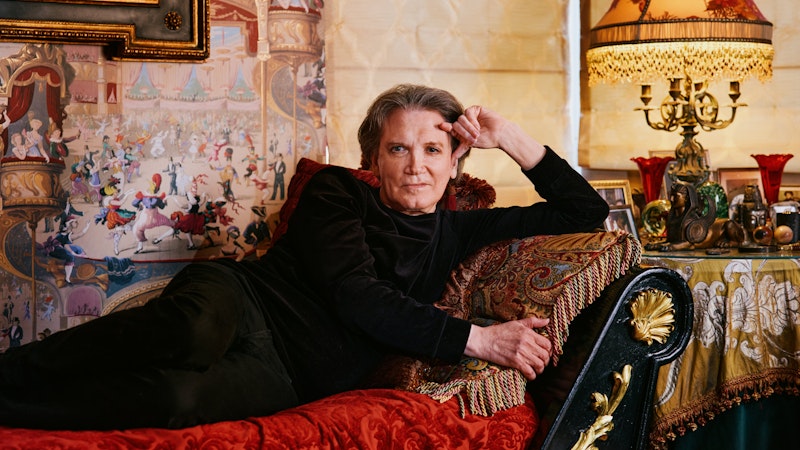I met Charles Busch once and had dinner with him.
I’d made a lot of money in D.C. real estate and had taken on, as one of my major charities, supporting the gay and lesbian film festival, Reel Affirmations. I’d give them so much money I’d be listed as a major sponsor and given many bennies. A parking space behind the Lincoln Theater and a skybox in it, extra tickets to all films and parties (which I’d give to clients), a full-page ad in the festival program. I’d meet whatever celebrity might show up, like the gay actors in the American version of Queer As Folk. One year I was invited to a dinner for sponsors and was seated beside Busch, the gender illusionist, actor, and playwright.
Busch, who went on to write more “mainstream” successful plays like The Tale of the Allergist’s Wife and to write the book for Taboo (Rosie O’Donnell’s Broadway version of a play about Boy George), was just then doing indie films like Psycho Beach Party (starring Lauren Ambrose) that would appear in film festivals. For gay people who follow gay writers Busch was already known as the author and “heroine” of an uber-campy off-Broadway play, Vampire Lesbians of Sodom. Vampire Lesbians is delightfully naughty in every way. It showcased Busch’s ability to impersonate a huge range of famous actresses from films of the 1930s, 40s, and 50s, since the plot involves an ancient Mediterranean monster who accidentally transmits her vampirism to the virgin sacrifice left by the villagers at the mouth of her cave. The two female vampires go through the centuries as lesbian lovers and then enemies, including as rival stars in Hollywood (think Garbo and Dietrich).
Something interesting about the play is that a subsequent major Hollywood film, Death Becomes Her, has a suspiciously similar plot, de-lesbianized for a mainstream audience. (This was back before plagiarism got you tenure track at Harvard University.) Goldie Hawn, the frumpy wife of plastic surgeon Bruce Willis, takes her husband backstage to meet her childhood friend Meryl Streep, now a Broadway and film star. Streep steals Willis and Hawn descends into depression, obesity and poverty. But at some point Hawn meets a witchy Isabella Rossellini, who sells a potion that provides eternal youth and beauty—though with a physical cost. Newly-beautiful Hawn steals Willis back, and Streep tracks down Rossellini to get some eternal youth and resuscitate her career. The two immortal women then become bonded like an old feuding couple, outliving Willis and everyone else they know, keeping their secret, and helping each other glue and paint their damaged body parts, since the potion made them immortal, young and beautiful, but no longer able to heal or regenerate.
I asked Busch about this at the small dinner I was at. He was uncomfortable and said he was going to get something out of it. He ended up playing a small role a year later as a female character in Addams Family Values, though it isn’t clear to me who was involved in stealing from him for the first picture or who was then involved in the second.
Last year Busch wrote his memoir, Leading Lady: Memoirs of a Most Unusual Boy. There’s no mention of Death Becomes Her in the book. There’s also no mention of whether Busch ever had a nose job (he has very large nostrils so separated from his nose by a crease and then flattened against his face that one imagines it’s the result of some attempt at a reduction, with a result that might encourage his desire to use makeup). The memoir appears to be honest, as Busch serves up many details of his life—his stint as a prostitute, everyone around him dying of AIDS—that some might’ve minimized.
Busch’s climb to a level of success was slow. His mother died young of a congenital heart defect and his feckless father paid him little attention (the family lived in a suburban home supplied by his wealthy aunt). He was an extremely effeminate little boy, and he graduated from Northwestern after being a very mediocre high school student. He worked as a temp and a call boy while doing off-off-off-Broadway plays, and finally worked with and wrote for stars like Joan Rivers, Rosie O’Donnell, Linda Lavin and had love scenes in indie films with actors like Timothy Daly and Jason Priestly. A reader looking for much in the way of insight into the gender fluid or non-binary won’t find it here. Like Elliot (Ellen) Page’s recent biography Pageboy, or Mae Martin’s autobiographical series Feel Good, about the only commonality is that they all had divorced, absent, or weirdo parents. But many people have bad or missing parents, and I’m friends with two couples who are lovely people and seem to be good parents who have daughters going or gone trans. (One seems to have gone trans and communist and then moved abroad just to fuck with her libertarian parents.)
Being girly is so “natural” to Busch after 70 years that the main preoccupations betrayed in his work are those of lots of old people, especially childless old people: real estate. In his 2021 indie film, The Sixth Reel, with a cast that includes a wrinkly Timothy Daly and a saggy Margaret Cho, and Busch’s own current troupe of aging and odd-looking character actors, the Busch character is mainly concerned about being evicted when a multinational buys his apartment building and plans to demolish it. It’s an almost unwatchable movie—most of these theater actors, including Busch in his non-drag scenes—need a lot more makeup and better lighting to be visually palatable on film. Busch’s aging character, family-less and childless, is saved by the discovery of a lost copy of a Lon Chaney film, worth a small fortune, about, what else, vampires.

